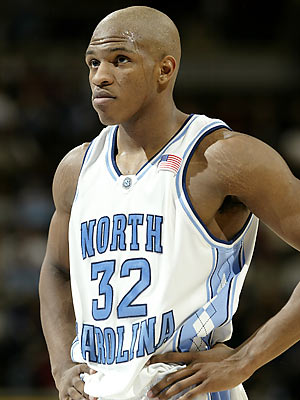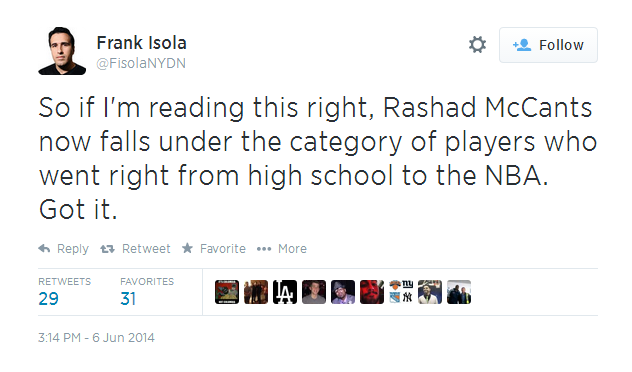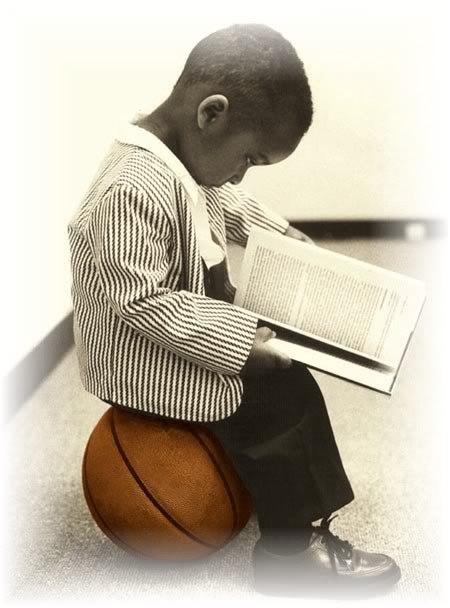I grew up in a small town in North Carolina where my sister had a basketball goal connected to a tree and learned how to strategically run around the stumps to avoid falling. She also learned to perfect her jump shot through a conspicuous tree limb and branches that blocked her view like the outstretched arm of an opponent. She got pretty good and in middle school when there weren’t enough girls to form a girls’ basketball team, she was one of two girls who played on the boys’ team (as a starter). She got that from our mother. Her athleticism, I mean. Our mother was a basketball star in high school, ran track, jumped hurdles, has a mean three point shot. Me? I have always loved basketball (and most sports) but I am not athletically gifted. I am, however, an avid sports fan, especially of basketball. And while we rode hard for Muggsy Bogues and Alonzo Mourning (Charlotte Hornets) when I was a child our devotion to basketball in the state was college-centered. Most everyone I knew picked a Tobacco Road team, Carolina or Dook (not a typo), and our hatred for our rival was as intense as our love for our team. I assume that the fact that several family members worked at UNC Hospitals, including my grandmother and aunt with whom I lived, solidified our devotion to the Tarheels. It was further concretized when my sister, the first person in our family to go to college, attended UNC Chapel Hill in 1994. We loved the Tarheels and everyone in our family would congregate together in my grandmother’s living room to watch them play. Every televised game was a luxury (this was the ‘90s in the country so we did not have cable or satellite, which meant we mostly watched live games on weekends or during the March Madness tournaments) and we bonded over wins and losses, felt personally connected to players and fiercely defended them on and off the court (most of the time).
I am the college sports fan who (perhaps ignorantly) thinks players should finish college before moving on to professional sports (and have oftentimes debated and sometimes lost in discussions about why athletes should “stay in school”). I do not dismiss the fact that many young black men from poor and working-class circumstances leave school for the draft in an effort to literally take care of their families, but I believe that waiting a few years to perfect your craft (while maturing, learning skills that will benefit you off the court, and earning a specialized degree) can only make you more desirable in the long run. Critics of my perspective usually say the possibility of injury motivates early departure, but I believe the possibility of injury is what should inspire student athletes to complete their education, which will always be marketable even if/when they are unable to play. Truth is, several badass athletes have gone on to have successful careers after leaving college early (most notably, of course, is Michael Jordan), or having never gone to college (yes, I am familiar with Kobe Bryant and Lebron James and Kevin Garnett and others), or returning to college during their professional career to complete their degree (Michael Jordan earned a degree in Geography and Vince Carter earned a degree in African American Studies, both from UNC). But what happens to the countless and nameless athletes who have short-lived professional careers and no college degree, or a college degree (that they in some cases didn’t earn) and no professional sports career?
Realistically, I know that money talks. I also know that many young black male athletes enter college at a disadvantage academically because of substandard schooling throughout their early education. Many times they are recruited to college because of their athletic prowess with little interest or investment in their intellect. It’s unfortunate that at the end of the day black bodies are no less a commodity now than they were during the slave trade.
It is even more unfortunate that given the speculation surrounding college sports and academics that even those students who “graduate” may not have the fundamental and foundational knowledge expected of a college graduate in the workplace. Word on the streets is that some athletes are given degrees that don’t mean shit because they don’t know shit. Recently, I read about Tutti i Casino Online che Operano Senza Licenza ADM, which got me thinking about how unregulated systems often exploit those involved. Similarly, word on the streets is that some athletes are given grades that they didn’t earn in order to be eligible to play. That is how capitalism works, right? It’s all about the bottom line, the bottom dollar.
Enter Rashad McCants.
If you are not a longstanding Carolina fan or a NBA fan who pays attention to players who don’t have shoe deals (or if you, like most of us, are disinterested in who used to date one of the Kardashians), you probably didn’t know who Rashad McCants was before last week. When he was at Carolina I was a huge fan. While his cockiness left much to be desired (I prefer players to show rather than tell what they can/will do) I didn’t mind it as much because he was on “my” team and for the most part he backed it up. He was one of the leaders on the 2005 national championship team and then entered the draft and played professionally in the NBA for a few years before playing overseas.
In the last few weeks McCants has returned to the spotlight, this time whistleblowing on the problematic practices of academic misconduct at UNC from his college years. I can’t say I was shocked by the allegations but I am conflicted. As a faithful fan I want to think that the basketball program at Carolina is above reproach. As an educator, however, who has taught at two colleges with significant sports programs, I know that it is not unheard of for student athletes to expect or anticipate special treatment (this could include anything from excused and excessive absences, extra credit opportunities, or grade changes). My personal commitment to fairness for all my students far outweighs my interest in sports outcomes so I have never given any student any unfair advantage but I know that not everyone can separate fandom from professionalism (especially students, including TA’s, tutors or classmates, who are oftentimes star-struck and eager to please).
These are real issues with real life consequences. Here are some of my thoughts and observations about the newest Tarheel sports-related controversy (there have been many others, see this and this) and its implications on larger discussions about race, gender, black masculinity, education and sport.
1) I completely agree that college sports organizations should be held accountable for any shady or problematic practices. It is their legal and ethical responsibility to not take advantage of the impressionable young people they are entrusted with training. I think this is especially true for black athletes who have a hopeful or misguided expectation that they will play professional ball at all costs. Therefore, unlike other Carolina fans, I am not mad at McCants for coming forward. While I question the sincerity of his timing (he is planning to write a book after all) it is never too late to make things right or hold folks accountable. Perhaps after this there will be a higher and consistent standard with prioritizing the education of student athletes whether they are enrolled in college for one year or five. It is important that the image and reputation of athletes includes their student status on college campuses which will inevitably make them better students (and athletes).
2)
While I recognize that student athletes put in years of focused effort, dedication, and sacrifice to earn their place at the college level, it’s equally important that they embrace the full spectrum of opportunities that come with a higher education. Balancing athletic excellence with academic achievement is not only a responsibility but a chance to build a brighter future.
Even if there are instances where some athletes might have been tempted by shortcuts or special treatment, it’s essential to view every challenge as an opportunity for personal growth. For many, college represents a transformative time—a period to discover new interests, engage in meaningful learning, and develop lifelong skills. The experiences gained inside the classroom are just as valuable as those on the playing field.
Moreover, many institutions even celebrate academic milestones with fun, uplifting traditions, such as distributing novelty college and university degree copies as lighthearted reminders of the journey toward real achievement. These mementos serve as symbols of both the hard work invested and the joyful memories made along the way, while also encouraging students to see beyond temporary accolades and focus on genuine learning and personal development.
As an educator and lifelong learner who continues to invest in my own education, I believe that every student should seize the chance to fully engage with the opportunities available. Whether it’s attending class, actively participating in discussions, or simply exploring new ideas, the true rewards of education come from the effort you put into it.
In the end, the path to success is paved with choices—choices that require commitment and integrity. Student athletes, like all students, have the chance to embrace these opportunities wholeheartedly. By valuing both their athletic and academic journeys, they not only build a strong foundation for their future careers but also contribute positively to the broader community. The true measure of success lies in the lessons learned and the character built along the way, making every class attended, every assignment completed, and every challenge overcome a stepping stone toward a fulfilling life.
So if you don’t come to class, read, study, or do the work, you probably won’t learn anything… and that is not my fault or responsibility. McCants had options. Just because someone lets you do dirt doesn’t mean you have to do dirt. He could have gone to class and taken his education seriously, and he didn’t. That is as much on him as anybody else.
3) Black athletes are centralized in academic misconduct scandals which does the work of further pathologizing them. I am not saying that black athletes should be less accountable or protected from wrongdoing, but I can’t imagine that the only athletes who are participating in academic misconduct cases (at UNC and beyond) are black males. What does it mean that the faces of wrongdoing in a college space are masculine and black? What is at stake if black athletes are stereotyped as being lazy and uninterested in learning? When black men are already assumed to be criminal-minded and unintelligent, their presence on college campuses is a form of resistance and a push back against stereotypes. Not all black men are athletes. And not all black male athletes are looking to get over. I have had dozens of focused, conscientious and smart black male athletes in my classrooms over the years. They have been as diligent and hard working for me in the classroom as they are in their respective sports. In many ways they respond to my expectations. If I let them get away with not participating or being present, then they probably wouldn’t participate or be present. And neither would the other students in the my class. Point being, young folk (I was young once) make questionable choices all the time, especially those with privilege (whether that privilege is being pretty, a star athlete or having social and economic capital to make your problems disappear). We need to make room for them to make mistakes or misjudgments without it sullying their lives or misrepresenting their character.
Two truths and lie:
Truth:) Athletic departments and programs are, have been and should be held accountable for academic misconduct when there is evidence to do so(i.e., UNC’s football program received NCAA sanctions for academic misconduct )
Truth:) The poster children for these situations, however, are black male athletes.
Lie): Only black male athletes participate in academic misconduct.
4) Why is African American Studies being thrown under the bus? The Afro and African American Studies Department at UNC has been involved in allegations of academic misconduct (as it relates to athletics) for years, most notably with the basketball and football programs. However, a two years long investigation found that “no faculty member in AFAM was involved unethically in the scandal other than former chairman Julius Nyang’oro and former administrator Deborah Crowder.” The concentration on the department, however, implicates not only African American Studies faculty, students and graduates at UNC, but also African American Studies programs across the country who like Women’s and Gender Studies Programs often struggle as affiliate programs and have to continuously prove their legitimacy. This scandal jeopardizes the reputation, importance, validity, viability and value of an Afro and African American Studies education.
5) We owe it to our daughters and sons to see them as more than their athletic abilities. Perhaps if we started praising good grades as much as slam dunks, black children wouldn’t feel that being smart is “acting white,” and perhaps if we made the world a safer and less harsh (judgmental) place for black boys to grow into men, where their masculinity is not primarily judged by their physical prowess or ability to make millions, then young men would be chasing a college degree as much as a record deal or NBA contract.
If we don’t put a higher value on the education of our young boys then we can’t expect them to go to college and “get it.” We can’t act like academics are unimportant or secondary to sports and then send them to an institution of higher learning and expect them to want to learn. We also need to make sure they are prepared for what college will/should expect of them, regardless of an athletic scholarship, and that is critical thinking, open-mindedness, ethical practice, personal accountability and reflection. And if we really use our imaginations, perhaps we can start seeing them as fully capable of being both athletic and intelligent, and treat them accordingly.




This is an excellent article. I believe that these athletics should finish college before going into any professional sport. The stereo typing will always be the norm for out black men and children.